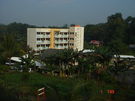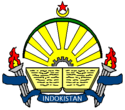Indokistani Third Republic
Republic of Indokistan Republik Indokistan | |||||||||
|---|---|---|---|---|---|---|---|---|---|
| Motto: Negara Abadi | |||||||||
| Anthem: Serdadu Indokistan | |||||||||
| Location | Albania, Burkina Faso, Indonesia, and Micras | ||||||||
| Capital | Koskenniemi | ||||||||
| Official languages | Indonesian and English | ||||||||
| Demonym(s) | Indokistani | ||||||||
| Government | Presidential unitary republic | ||||||||
| Abdul Rasyid I | |||||||||
| Mustafa Hakim | |||||||||
| Legislature | National Consensus | ||||||||
| Establishment | 3 October 2012 | ||||||||
| Time zone | UTC +7 | ||||||||
| |||||||||
The term Indokistani Third Republic (Indonesian: Republik Indokistan Ketiga) refers to a short-lived and last incarnation of unitary "Republic of Indokistan" established on 3 October 2012. The Republic was declared by Abdul Rasyid I that ordered the restoration of the unitary system of government that ended the Federal Republic of Indokistan after pro-unitary campaigns led by Tian Abdurrahman.
Third Republic was known for its extensive reform plan proposed by state politicians, with the most prominent were proposals from Abdul Rasyid I and Mustafa Hakim. The Republic collapsed in December 2012 after the Royal Council Rebellion that paralysed the government, which led into the establishment of the Provisional Government of Indokistan that initiates the National Reform stemmed from the proposals made on the Third Republic era.
History
The Republic was established (or "restored", as referred by pro-unitary activists) on 3 October 2012 after the Federal government decided to abandon federalism and adopted unitary system that had been used in Indokistan for years, including the Second Republic. Movement to adopt the unitary system was led by anti-federal Tian Abdurrahman that attracts many support by discontented citizens that opposed the federation.
Shortly after the formation of the Third Republic, a conflict with Al Rasyid Darussalam breakaway state of Wenang was ignited after unilateral border modifications provoked Indokistan. The war was asymmetrical, as Indokistan easily dominated the warfare and less than a week after the declaration of war, successfully took over Wenang capital that led to resounding defeat for Wenang.
Establishment of the Third Republic was perceived as the right time to execute a large-scale and extensive reform, with politicians competing to submit their proposals on the proposed reform. Prominent proposals that received public attention were made by Abdul Rasyid I and Mustafa Hakim in November 2012. Both proposals and the entire reform attempts were failed as the Third Republic collapsed in December 2012.
Government and politics
Except the restoration to unitary system and nomenclature changes, the remaining governance system on the Third Republic remained unchanged. After the disbandment of the Indokistani Federal Council from the former Federal Republic, the Republic returned to the usual separation of powers, with both Abdul Rasyid I and Mustafa Hakim remained as President and Chancellor, respectively.
Political parties
There were three political parties established on the Third Republic, each parties representing their own provinces. Those parties were the Democratic Party (Al Rasyid Darussalam), Duck Party (Barakstan), and Solidarity Party (Indokistan). A parliamentary election was planned to take place in January 2013 with all parties participating, yet was failed due to the collapse of the Third Republic.
National Consensus
National Consensus (Indonesian: Konsensus Nasional) was a quasi-legislative assembly of the Third Republic. Despite the government does not ascribe the assembly as the national parliament, it has law-making power and were able to decide on national interests and issues. Membership of the council consists of elected members, President, Chancellor, and mayor of cities. The initial plan was to convene the assembly monthly, yet until its disbandment it was failed to be convened.
Administrative divisions
Administrative divisions of the Third Republic were virtually unchanged, besides on nomenclature changes from "Republic" to "Province", to reflects the unitary nature of the Third Republic.
| Provinces of the Indokistani Third Republic | |||||||||||
|---|---|---|---|---|---|---|---|---|---|---|---|
 Travenoraș, Central Indokistan |
Flags | Province | Capital | Governor | Location | 
| |||||
 |
Al Rasyid Darussalam | Bandar Rasyidin | Abdul Rasyid I | Manado, Indonesia | |||||||
 |
Bobodolands | Kota Dacoen | Tian Abdurrahman | Bandung, Indonesia | |||||||
 |
Indokistan | Jumstraad | Mustafa Hakim | Jakarta, Indonesia | |||||||
Reform Plan
Throughout the history of the state, there are several proposals published by Indokistani politicians aimed on reforming the system inside the country with their respective ideals and goals they wished to achieve. These plans were eventually failed as the Third Republic collapsed in December 2012, but inspiring the next provisional government to held similar reform, that end success.
"Abdul Rasyid I's Five-years Plan"
In November 2012, Indokistani president Abdul Rasyid I issued his manifesto called Rencana Pembangunan Lima Tahun (Five-years Development Plan) and sent it to Chancellor Mustafa Hakim, as he wished that he can discuss it together with him and the parliament. The main plan that was to change the political and economic system.
On political system, he proposed the country to be a semi-presidential republic, with the president and chancellor can both control each other. Both president and chancellor subordinate to the State Council, which on his system placed on the top of political hierarchy. State Council inaugurate president and parliament and observing all political activity of president, chancellor, and the parliament. State Council had power to vetoed all laws created either by president, prime minister, or parliament, amending national constitution, and declaring war.
He also proposed a cohabitational government, on which president-appointed chancellor must be from opposing party inside the government. Chancellor, on the other side must form a quota-strict cabinet, Abdul Rasyid's plan was to give 70-30 percent quota between the governing (president) party and the opposition. President can vetoed his choice, and if the appointed-chancellor failed to establish a cabinet in two weeks since his appointment, the chancellor must resign to be replaced by another parliament member.
On economic policy, he porposed a formation of various taxes and customs and establishment of various economic offices. He also established a state body regulating religious-obligated - especially Islamic - taxes, unusual since Indokistani nature of secularism. The proposals also established number of taxes that the citizens must pay and salaries for government officials.
His proposal on political system was radical, especially because it emphasized party politics as one important factors, which was seen unusual since previous government doesn't put political party as defining part in the government. His proposal on economic system was very throughout and highly detailed, with even salaries and tax prices was written. His plan on economic system was the most detailed ever in Indokistani history, even surpassing the current Federal State that only dictates the economic basis instead of detail regulations.
"System Changes Proposal"
The proposal was created by Chancellor Mustafa Hakim in November 2012, assuming the proposal is to make match with Abdul Rasyid I proposal given before. Using pretext that the country still not condusive despite of stability after Al Rasyid Darussalam and Bobodolands Barakstan joined Indokistan, he proposed changes on political, economical, social and cultural system. Despite on the fields he proposed to change, he only filled the political proposal, with economy and the rest remain unfinished.
The first paragraph described the political system proposed doesn't give any particular system to be practiced by the country, but only dictates that the system should not be direct democratic - since it will be very difficult - and communist. He also write that he cannot give any suitable system because he need to review the progress of the country.
The second paragraph proposed the numbers of ministries that Indokistan should have. With 5 ministries, the council was to be called "Coordinator Council" and the members to be called "Coordinator". These coordinators are managing internal affairs; foreign affairs; defence, law, and human rights; social and society; and economy and finance. He also dictates that this system no longer need chancellor position since the chancellor was replaced by the coordinator of internal affairs.
Collapse of Third Republic
Royal Council of Al Rasyid Darussalam, an influential advisory council for Abdul Rasyid I (reigned in his home state as "King Abdul Rasyid I") as the King of Al Rasyid Darussalam province, called for secession of Al Rasyid Darussalam from Indokistan, citing the central government incompetence as justification. They claimed that the central government failed to maintain political stability and prosperity for the province. Their first attempt to persuade Abdul Rasyid I to voluntarily declared secession, was unsuccessful.
Afterwards, the Royal Council set an unsanctioned referendum on 18 December and claimed that the results overwhelmingly supported the secession. The vote was dismissed by the central government, and Abdul Rasyid I himself accused the Royal Council of fraud and vote rigging. After the referendum, local troops began to defect and declared their support for the Royal Council and independence. Abdul Rasyid I, realising that he would be in danger if he opposed the Royal Council, decided to resign from presidency and declared secession by signing the secession treaty that had been prepared by the Royal Council beforehand. In the end of the day, Al Rasyid Darussalam was restored as an independent country.
The secession of the province and departure of the president led into instability and threat of breakup of Indokistan. The remaining provinces later announce their support for the central government and guarantee to not to secede from Indokistan. The chaos left after the secession later seen as the proper time to execute a large-scale reform, that was started by the establishment of the Provisional Government of Indokistan led by acting president Mustafa Hakim in January 2013.

